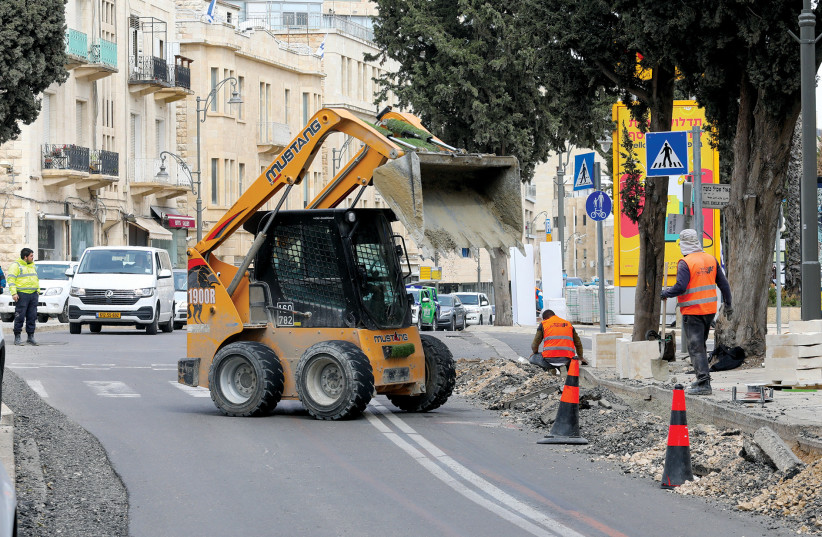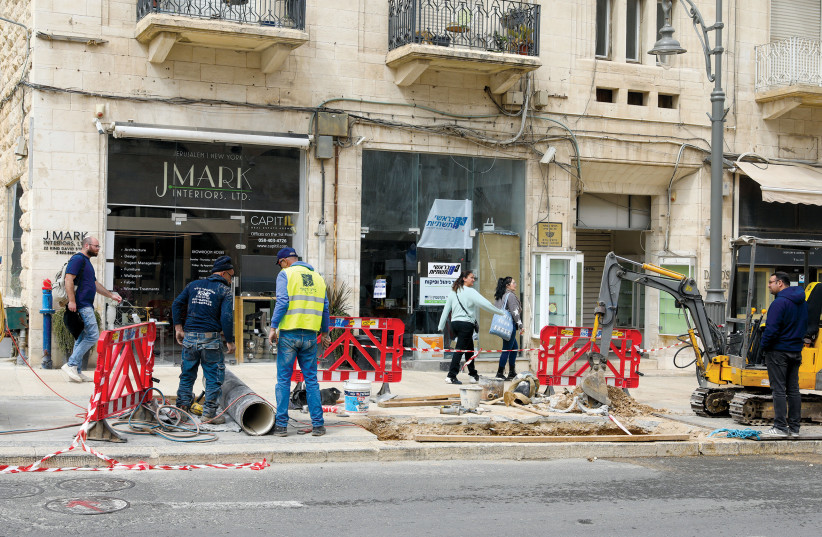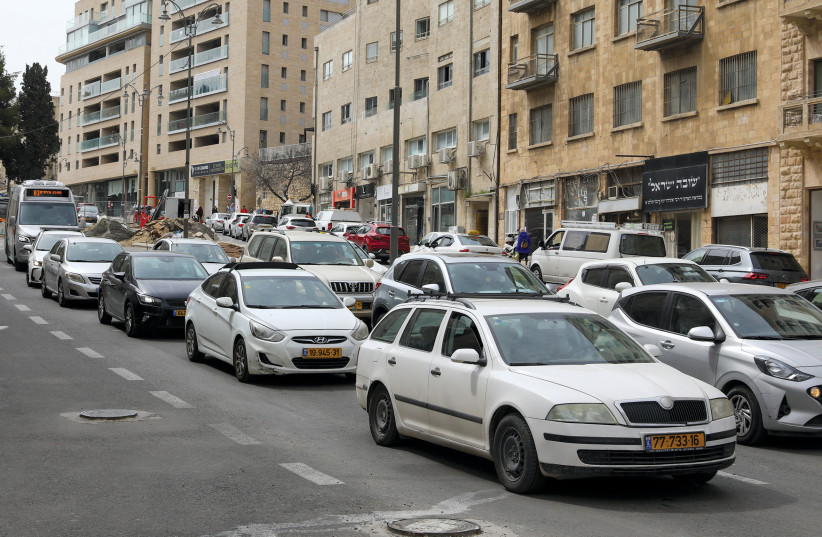Anyone been down King David Street recently? Actually the temporal epithet should be treated a little lightly.
Work began on renovating, repairing, reimagining and otherwise refashioning the major thoroughfare in this fair city almost exactly a year ago. During that time navigating the street has been a mite challenging as traffic was intermittently routed one-way, then two-way with some interesting meandering logistics involved, then back to one-way and back again.
The road surface was duly scraped, cracks were widened, new potholes appeared, and tarmac scree was scattered asunder. Meanwhile, the sidewalks were repaved and widened, and the dedicated workers even managed to mark out an elegant-looking cycle path as part of the swelled sidewalk on one side of the street. Never mind that the markings are barely visible and – as Bicycles for Jerusalem and probably every cycling body around the world have repeatedly declared – biking routes should not be on the same level as the pedestrian area.
So, what have owners and employees of stores, galleries and eateries along the thoroughfare to say about the ongoing municipal beautification project? “This has had a damaging effect on us,” says Leike, who works at Cohen’s Deli on Washington Street, just round the corner from King David Street. “We have had fewer customers coming in.”
That sentiment was echoed by everyone I spoke to down there earlier this week. The seemingly never-ending tales of woe faced by storeowners, restaurateurs and hoteliers in downtown Jerusalem is enough to make even Job balk – the Second Intifada, which raged between 2000-2005, construction work on the first line of the light rail, which began in 2000 and was due to be completed in 2006 but, in fact, ended in 2011, and the “Knife Intifada” of 2015-2016 to mention just a few of the trials and tribulations faced by locals who are desperately trying to keep the wolves at bay.

And now this. Then again, how much worse could things get? As some tourism-oriented concern heads told me, as so few people are coming into the country right now the protracted makeover of King David Street isn’t hurting that much. At this stage of the game Yaakov Ben David, who owns a retail antiques and Judaica gallery, feels the continuing roadworks are like water off the proverbial duck’s back. “It is a problem when there are tourists around and they can’t get to us because of the mess outside or other stuff the municipality gets up to,” he says a little mournfully. “But there are no tourists here anyway, so what have we got to lose?” he shrugs.
Did the municipality, at least, let Ben David know what he and his neighbors were in for? “No, they just turned up one day, the workers, and started on the road,” he states. “There was a big mess, and noise, but there were no clients so it has less impact. We weren’t doing much anyway.”
Ben David comes across as a long-suffering Jerusalemite who has seen a fair bit in his time. He says he didn’t even bother contacting the municipality when the work began outside his store, to ask how long he might expect to be inconvenienced. “It was just one more thing to take. Hopefully the tourists will come back sometime and things will pick up again,” he smiles a little wearily. “Please God, the Messiah will come,” he adds as I leave.

Yankale Turjeman says he has also seen his fair share of disruptions to the smooth operation of the 1868 restaurant near the corner of Ben Shimon Street, although that is somewhat mitigated by the business hours he keeps. “We generally work in the evenings [after the road workers pack up] so we have been less affected by the roadworks. But we have a sushi food place just here [on King David Street] which works during the day, and that has suffered.”
Like Ben David, Turjeman takes a resigned philosophical view of infrastructure developments in the area. “We have had the demonstrations [against former prime minister Benjamin Netanyahu] around here too. So this is just another pain in the neck.”
Mind you, the chef says he can’t fault the municipality in terms of keeping to the declared timetable. “They said it would take a year and a half. So I guess they are coming in ahead of time,” he laughs.
Turjeman says it would have been nice to have been informed of the municipality’s intentions, but he notes that he and his neighbors have become accustomed to incursions into the natural flow of things. “In general, you could say this kind of work has been going on for 10 years.”
FLEUR HASSAN-NAHOUM, deputy mayor in charge of tourism and art in the public space, empathizes but believes the municipality has done its utmost to take local needs into consideration, across the larger picture. “The last two years, with the coronavirus, have given us an opportunity to upgrade major spots around Jerusalem, and we have done our best not to waste any time,” she says.
She knows the trying score. “Jerusalemites have suffered with multiple works going on at the same time,” she notes, “and I know many people did not understand why [Mayor] Moshe Lion was pushing for so much work to be done during the pandemic. While others stopped he kept on pushing. He made sure the work continued. That’s why we managed to do the work on King David Street in a year and half instead of three years,” she adds with a laugh. “I have a lot of sympathy for the businesses on the street, but corona hit them harder. And we gained time and used a terrible situation to improve things.”
Hassan-Nahoum says there is much to look forward to, and that the labor pains will be vindicated by the rebirth of the area. “There are going to be all sorts of sculptures on the street, and a fountain. We painstakingly planned the work, to make sure it remains a central spot for tourists, with all the beauty and history there, and the major hotels.”
Considering the almost complete dearth of incoming tourists for the past couple of years, the latter sounds a little unearthly, practically irrelevant. Hassan-Nahoum says local tourism is due to come roaring back to robust revenue-generating life. “The King David and Waldorf Astoria, our two major hotels, are right there. I expect all the tourists to come back by Passover.”
Really? Even with the waning COVID-19 figures, and the easing of restrictions on what we used to call normal life, that is a little hard to imagine. In 2019, in those far-flung pre-pandemic days, Jerusalem’s economy was boosted by a record four and a half million visitors, which made the sector’s lockdown collapse all the more painful.
The deputy mayor says a return to those halcyon days is on the cards. “I am confident that is going to happen,” she states. “I have seen the hotel bookings.” That has got to be good news for battle-hardened proprietors trying to make an honest crust.
Turjeman says were that to transpire, it would not be a moment too soon. He also questions Hassan-Nahoum’s contention that the municipality scheduled the urban refit to make the most of the pandemic hiatus to complete the public space renewal while enterprises on the street were already on a Health Ministry-guided furlough. “The municipality’s timing is really screwy. They had the whole of the corona period to get this done.”
I asked the Jerusalem born-and-bred chef if he tried to contact someone at the municipality, to explain how he, and his fellow business owners, felt. “There would be no point in doing that,” he came back at me. “There’s no one to talk to. It’s like tilting at windmills.”

Then again, he says the guys on the – literal – street did make an effort to advise him of short-term disruptions. “On a day-to-day basis they did come by to tell me about cutting off the water supply, and that sort of thing. But that’s the ordinary folk communicating with other ordinary folk. But the people higher up don’t really care.”
The “higher-ups” in Turjeman’s book mean anyone above the rank of the foot soldiers doing the actual manual work on the street. “I don’t know how the site foremen are running things. They shut off the water four times, for this and that. Why couldn’t they get that done in one go? It would have made life a little easier.”
That, says Uri Rosenbach, could also have been achieved on a financial level. “Why didn’t they, at least, reduce our council tax payments while all this mess was going on?” he posits. “Look at this,” says the American-born Jerusalemite pointing to the towering sweep of black rubber tubing arching out of a pile of sand and stones right outside his eponymous art gallery. “They say that is going to be a beautiful fountain. We’ll see,” he adds ruefully.
AND IT’S not just local businesses that have borne the brunt of the ongoing roadworks. Drivers who could not avoid the area had to factor in more travel time for their A-to-B downtown logistics, as have public transport users. “A few days ago I was on the 13 bus and, as we got to the lights on the corner of Agron Street and King David Street, we waited ages and ages,” says Ruth Davis, a regular passenger on the route. “There were about a dozen yellow-jacketed workers there. They’d switched off the traffic lights and the workers were doing nothing. This was just before 9 o’clock in the morning. Can you imagine what it must have been like later in the day?”
The nonagenarian feels that, once again, having access to more information might have helped locals who get about town by bus. “For a long time the bus didn’t even go down King David Street. They changed the route and there was no bus stop from King George Street until Jabotinsky. There were often people on the bus who didn’t know, and they’d asked the driver why he wasn’t stopping. There was no information about that at any bus stop. They should have done that.”
Hopefully all that will be behind everyone soon. According to Hassan-Nahoum the grand opening of the made-over street has been set for April 3. The municipal spokesperson’s department said the “comprehensive upgrade” includes work on “infrastructures, traffic, a cycle path and beautifying the public domain, including paving work and installing high-standard street furniture.” The spokesperson, however, appears to be a little at odds with Hassan-Nahoum with regard to the official launch of reborn King David Street. “The vast majority of the work will be completed by the end of the month,” the statement read, noting the enticing benefits in store for the public, albeit a little further down the line, after the ceremonial ribbon is cut. “When all the work is completed, in the coming months, the historic street will be more beautiful, more modern, while preserving its historic character.”
That sounds like an attractive proposition. No doubt local business people will breathe a sigh of relief once the infrastructure project is done and dusted, and will look forward to a duly resuscitated tourism scene and their cash tills operating, once again, at normal speed. ❖
